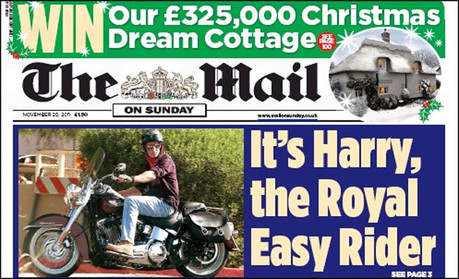
Lord Leveson has called for journalists from the Mail and Mail on Sunday to give evidence to the inquiry
Lord Leveson has called for journalists from the Mail and Mail on Sunday to give evidence to his inquiry following allegations from Hugh Grant that a story about in the newspaper was obtained using phone hacking.
The controversial allegations were made during Grant's appearance at the inquiry yesterday, and prompted the Mail on Sunday to accuse the actor of "mendacious smears".
Addressing the controversy today, Leveson asked Jonathan Caplan QC – the lawyer representing Associated Newspapers, publisher of the Mail and the Mail on Sunday – whether "the relevant journalists could make statements and give evidence".
Caplan replied that they could.
David Sherbourne, the lawyer representing the individual alleged victims of phone hacking at the inquiry, warned that the Mail on Sunday's statement was not a "right to reply" as Caplan had claimed but an "attack", and risked putting witnesses off giving evidence.
"Mendacity means lies … There is a real distinction between someone who makes a statement that he knows to be untrue and someone who says something that they don't have the evidence to back up".
Counsel for the inquiry Robert Jay QC, suggested that any individual or group on the receiving end of accusations from inquiry witnesses should be given the earliest opportunity to refute them and their refutation should be made clear at the inquiry.
Associated Newspapers denies that the Daily Mail or Mail on Sunday has ever been used phone hacking, and specifically denies that the February 2007 article mentioned by Grant was obtained using the illegal practice.
But Grant told the court that he believed it was the only way the Sunday newspaper could have gained its information for the story.
"I cannot for the life of me think of any conceivable source for the story in the Mail on Sunday except those voice messages on my mobile phone," he said.
Grant had not made the allegation in the public domain before yesterday. He told the inquiry that "the penny dropped" about the story only in research for his testimony.
Caplan told the inquiry today that the allegation was "extremely serious".
"This was a very serious criminal allegation against Associated Newspapers and its staff."
Defending the statement issued by the Mail on Sunday which accused Grant of lying, Caplan said: "I had no opportunity to put questions directly, and there is no right for me to make a contemporaneous reply at the conclusion of his [Grant's] evidence to rebut or to deny allegations that had been made."
He added later: "There was no clear opportunity for us to respond during the inquiry ... and Associated Newspapers was under considerable pressure to respond".
In response to Caplan's assertion that the allegation against the Mail on Sunday was "extremely serious", Leveson told the lawyer: "So was the allegation made against Mr Grant."
During the lunch break at the inquiry, Leveson read the statements issued by both the Mail on Sunday and Daily Mail, which he hadn't previously.
He said that the Mail on Sunday statement accusing Grant of "mendacious smears" had "considerable force behind it".
He added that he was "extremely concerned" that the arguments relating to this inquiry are conducted here and not elsewhere".
Leveson told the inquiry that he would not attempt to determine himself whether or not the story in the Mail on Sunday had been obtained by phone hacking, but did see fit to ask whether the authors would give evidence.
Free daily newsletter
If you like our news and feature articles, you can sign up to receive our free daily (Mon-Fri) email newsletter (mobile friendly).









